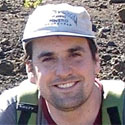Advisory Board and Editors Plant Science

Todd J Vision
I am Associate Professor of Biology, and Adjunct Professor of Information and Library Science, at the University of North Carolina at Chapel Hill. Much of my work has been on evolutionary genetics in plants, including ancient genome duplications, phylogenetic analysis of gene family diversification, and structural genomic variation in natural populations. I also have interests in computational biology, particularly the applications of ontologies for reasoning over large scale about phenotypic diversity data, and have been engaged in a number of projects to study and improve the infrastructure for scholarly communication, particularly open research data.

Christian Wehenkel
Professor of forest genetics, forest ecosystem analysis, forestry, biometrics, forest growth, and biodiversity, Universidad Juarez del Estado de Durango. Author / co-author of more than 170 international and national publications.Technical manager of more than 40 national and international projects. Evaluator of CONHACYT, Mexico and other institutions. Member of the Latin American Forest Genetic Resources Network (LAFORGEN).

Michael Wink
Prof. Dr. Michael Wink is Professor of Biology and Director at the Institute of Pharmacy and Molecular Biotechnology of Heidelberg University; Head of Biology Department (1989-2019). Senior professor since 2019. Editor of Diversity, Biotechnology Journal and Journal of Ornithology. Member of several editorial boards and scientific societies. Author of over 20 books and over 900 original peer-reviewed publications.

Robert Winkler
Robert Winkler is Principal Investigator of the Laboratory of Biochemical and Instrumental Analysis at the CINVESTAV Unidad Irapuato and faculty member for the postgraduate programs Plant Biotechnology and Integrative Biology. His research topics include novel mass spectrometry techniques such as low-temperature plasma ionization and covalent protein staining, new approaches in the high-throughput metabolomic profiling of plants, computational mass spectrometry and proteomics.

Xiangyang Xu
Research Geneticist (Plant) at the USDA-ARS Wheat, Peanut, and Other Field Crop Research Unit.
My current interest is in wheat genetics, genomics, and breeding. I focus on wheat pest and disease resistance, including Russian wheat aphid, greenbug, bird cherry oat aphid, leaf rusts, and powdery mildew resistance etc.

Yunfeng Xu
Dr. Yunfeng Xu is currently working in School of Biological Science and Technology, University of Jinan. Dr. Xu focuses on wheat genetics and breeding, fine mapping and the cloning of important wheat genes for yield traits, as well as developing robust molecular markers for wheat improvement.

Nasim Ahmad Yasin
Dr. Nasim Ahmad Yasin is a Associate Professor at the University of the Punjab carrying out research in the field of Horticulture and Environmental Science.
Educational background:
2021-2022: Post-Doctorate: Vegetable Research Institute, Guangdong Academy of Agricultural Sciences, China.
2015: PhD: Institute of Agricultural Sciences: University of the Punjab Lahore.
1997: MSc. (Hon): University College of Agriculture, Rawalakot: The University of Azad Jammu and Kashmir –Muzaffarabad Azad Kashmir.
1995: BSc. (Hon): Barani Agriculture College, Rawalpindi. University of Agriculture, Faisalabad.

Humaira Yasmin
Dr Humaira Yasmin is tenured Associate professor (TTS) within the Department of Biosciences, COMSATS University, Islamabad, Pakistan. Her research interests include plant-microbe interactions, plant stress physiology, biofertilizers technology, soil microbiology, crop pathology, plant protection, plant biochemistry and molecular biology, medicinal plants, environmental microbiology, and agricultural nanotechnology. Dr Yasmin's research focuses on understanding the detailed biochemical mechanisms adapted by crops when exposed to biotic (fungal/ bacterial) pathogens, abiotic stresses (drought, salinity, heavy metals and heat). She is also investigating various eco-friendly and economic solutions to reduce the adverse impacts of environmental stresses on economically important crops. The techniques studied include isolation, characterization and mode of action of plant growth-promoting rhizobacteria (PGPR). Green synthesis and characterization of nanoparticles from medicinal plants and their application in agriculture to alleviate different stresses. Application of growth regulators (hormones (GA, ABA, SA, BS etc.), chelators (Oxalic acid, mellic acid etc.) and other chemical compounds to increase plant protection. Moreover, synergistic effects of the above mentioned solutions are also under consideration.

Heng Yin
Prof. Heng Yin is a Professor of Biochemical Engineering at Biotechnology Department, Dalian Institute of Chemical Physics (DICP), Chinese Academy of Sciences (CAS). He is also group leader at Natural Products & Glycoengineering Research Group, DICP, CAS. Director, Liaoning Provincial Key Lab of Carbohydrates. Prof Yin's research primarily focuses on glycoengineering and enzyme engineering, glycobiology and plant immunity.

Qianwen Zhang
Dr. Qianwen Zhang is an Assistant Professor at Mississippi State University.
Her research is focusing on Organic Agriculture, Biostimulant Application, Controlled Environment Agriculture, Hydroponics, Analytical Chemistry, Food Science, Microbiology, and Sensory Evaluation.

Lin Zhang
Dr. Lin Zhang is Associate professor within the School of Basic Medical Sciences, Hubei University of Chinese Medicine, Wuhan, China.
His research interests focus on:
1)How ectotherms (with tropical lizard as subject) linking bioenergetics and overwintering strategy during global warming
2)Macro-evolution including activity, metabolism and reproduction in squamate

Dapeng Zhang
Assistant Professor in Bioinformatics, St. Louis University.

